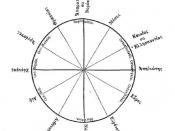In the 6th century B.C, there began a dualism in Greek Philosophy. The development of Greek Philosophy became a compromise between Greek monistic and oriental influences, in other words, a combination of intellectualism and mysticism. Thus began the pre-Socratic philosophy. The interests of pre-Socratic philosophers were centered on the world that surrounds man, the Cosmos. This was during the time of great internal and external disturbances in the Greek society, as it was right after the Peloponnesian war. The pre-Socratic era of Greek Philosophy came to an end when the Sophists turned their attention to man himself, delving into the moral and mental nature of man and dealing with the practical problems of life.
The ancient Greeks mirrored their nature, beliefs, morals and customs in Greek Philosophy. Through understanding Greek Philosophy, we can see how the ancient Greeks regard the world around them. Greek Philosophy filled the void in the spiritual and moral life of the ancient Greeks, where in the same place other cultures had their belief in a religion.
Wisdom, in the Greek sense, included not only a theoretical explanation of the world around them, but also provided a practical guide to life.
From Homer to Hesiod, we see the reflections of the ancient Greeks and their use of Gods to fulfill their spiritual, social and psychological needs. A lot of temples were erected for Greek deities, and the ancient Greeks worshipped Gods to avert calamities, to secure the success of a certain harvest, or as thanksgiving for success in battle or deliverance in wants and wishes. Homeric songs tells stories of how man realizes that all events are governed by natural laws. In the Homeric world, fantastic beliefs and superstitions governed one important aspect of the ancient Greeks-- immutable fate. Homeric poems reflect the occasional doubts...


